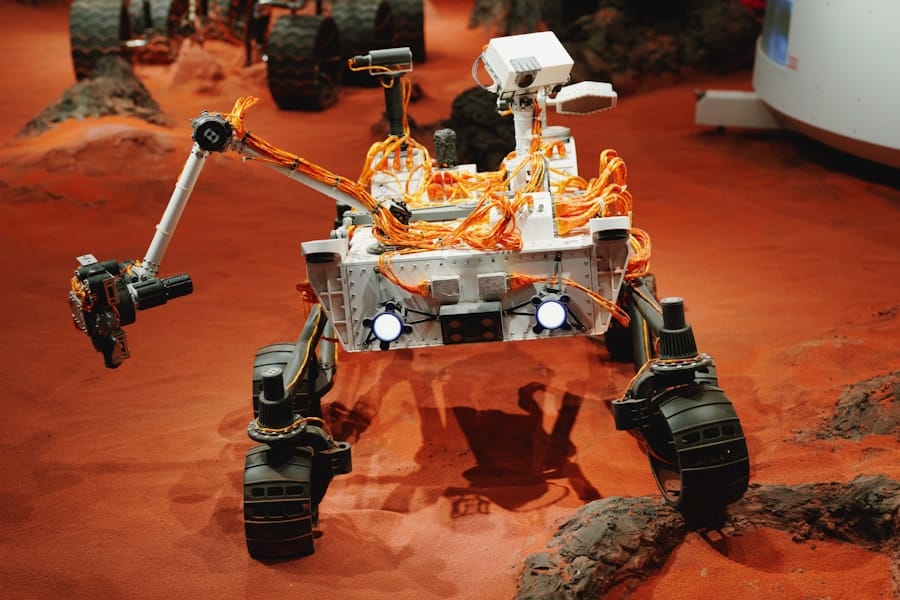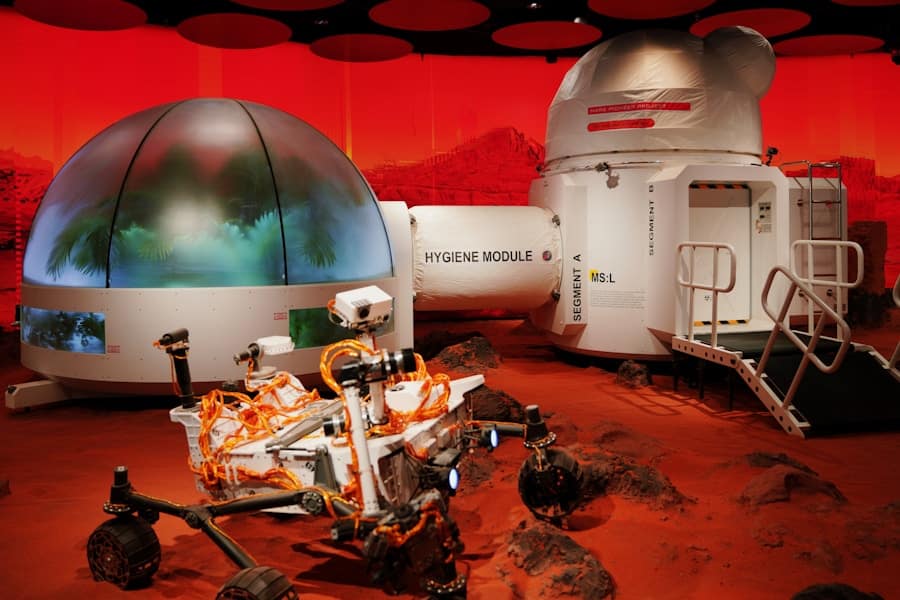The prospect of human colonization of Mars has captivated scientists, engineers, and dreamers alike for decades. As we stand on the brink of a new era in space exploration, the integration of artificial intelligence (AI) into this ambitious endeavor is becoming increasingly vital. The challenges posed by the Martian environment—extreme temperatures, radiation exposure, and limited resources—demand innovative solutions that can only be achieved through advanced technology.
AI offers a transformative approach to not only navigate these challenges but also to enhance the overall feasibility and sustainability of human life on the Red Planet. AI’s role in Mars colonization extends beyond mere automation; it encompasses a wide array of applications that can significantly improve mission outcomes. From autonomous rovers that scout the terrain to intelligent systems that manage life support, AI is poised to revolutionize how we approach interplanetary living.
As we delve deeper into the various facets of AI’s involvement in Mars colonization, it becomes clear that this technology is not just an accessory but a cornerstone of our efforts to establish a permanent human presence on another planet.
Key Takeaways
- AI is playing a crucial role in the exploration and colonization of Mars, assisting humans in various aspects of the mission.
- AI is essential for sustainable resource management on Mars, helping to optimize the use of limited resources and reduce waste.
- AI is instrumental in mitigating the risks and challenges of Mars colonization, providing advanced predictive capabilities and decision-making support.
- AI is enhancing communication and connectivity on Mars, enabling seamless interaction between colonists and with Earth.
- AI is providing crucial health and medical support for Mars colonists, offering advanced diagnostics and personalized care in the challenging Martian environment.
- Ethical and legal considerations of AI in Mars colonization are important to ensure responsible and fair use of AI technologies in this new frontier.
- The potential of AI in shaping the future of Mars colonization is immense, offering innovative solutions to complex challenges and paving the way for sustainable human presence on the red planet.
Role of AI in Mars Exploration and Colonization
Enhancing Data Analysis
AI systems can analyze vast amounts of data collected by rovers and orbiters, identifying patterns and anomalies that human researchers might overlook. This capability enables us to gain a deeper understanding of the Martian environment and make informed decisions about colonization.
Real-time Decision-Making
AI can facilitate real-time decision-making during missions. Autonomous drones equipped with AI can conduct aerial surveys of the Martian landscape, providing immediate feedback to mission control on Earth or to astronauts on the surface. This capability is crucial for adapting to unforeseen circumstances, such as equipment malfunctions or environmental hazards.
Shaping the Future of Colonization
By leveraging AI’s analytical power, we can enhance our understanding of Mars and make informed decisions that will shape the success of human colonization. AI can guide future colonization efforts toward resource-rich areas, detect signs of water or mineral deposits, and provide critical insights that will ensure the long-term sustainability of human settlements on Mars.
AI in Sustainable Resource Management on Mars

One of the most pressing challenges for any Mars colony is resource management. The planet’s harsh environment presents significant obstacles to sustaining human life, particularly when it comes to water, food, and energy. AI can play a pivotal role in developing sustainable systems for resource utilization.
For example, AI-driven algorithms can optimize water extraction from the Martian soil or ice deposits, ensuring that every drop is used efficiently. By analyzing environmental data, these systems can predict water availability and help design effective extraction methods. In addition to water management, AI can assist in food production through advanced agricultural techniques.
Hydroponics and aeroponics are promising methods for growing food in space, and AI can optimize these systems by monitoring plant health, nutrient levels, and environmental conditions. Machine learning models can predict crop yields based on various factors, allowing colonists to plan their food supply effectively. This integration of AI into agriculture not only enhances food security but also reduces reliance on Earth for resupply missions.
AI in Mitigating Risks and Challenges of Mars Colonization
The journey to Mars and the establishment of a colony are fraught with risks that could jeopardize human lives and mission success. AI can serve as a critical tool in identifying and mitigating these risks. For instance, predictive analytics powered by AI can assess potential hazards such as dust storms or radiation spikes, enabling colonists to take preventive measures.
By continuously monitoring environmental conditions with sensors and satellites, AI systems can provide early warnings and recommendations for safe practices. Furthermore, AI can enhance safety protocols for astronauts during their missions. Wearable technology equipped with AI can monitor vital signs and detect anomalies in real-time, alerting medical personnel if an astronaut is at risk of health complications due to environmental factors or physical strain.
This proactive approach to health monitoring not only ensures the well-being of colonists but also fosters a culture of safety that is essential for long-term survival on Mars.
AI in Enhancing Communication and Connectivity on Mars
Effective communication is paramount for any successful colonization effort, especially when considering the vast distances involved in interplanetary travel. The time delay in communication between Earth and Mars—ranging from 4 to 24 minutes—poses unique challenges for real-time collaboration. AI can bridge this gap by facilitating autonomous communication systems that allow astronauts to interact with their environment without waiting for instructions from Earth.
For example, AI-driven chatbots could assist colonists by providing instant access to information about their surroundings or operational protocols. These systems could analyze data from various sources—such as environmental sensors or equipment diagnostics—and deliver relevant insights to astronauts in real-time. Additionally, AI can optimize communication networks on Mars by managing bandwidth and ensuring reliable connections between different habitats and research stations.
AI in Health and Medical Support for Mars Colonists

The health and well-being of Mars colonists are critical components of a successful mission. The isolation and confinement experienced during long-duration space missions can lead to psychological stress and physical health issues. AI has the potential to revolutionize medical support for astronauts by providing advanced diagnostic tools and personalized healthcare solutions.
For instance, telemedicine platforms powered by AI could enable remote consultations with Earth-based medical experts, allowing colonists to receive timely advice on health concerns. Moreover, AI can assist in monitoring the physical health of astronauts through wearable devices that track vital signs and physiological parameters. Machine learning algorithms can analyze this data to identify trends or anomalies that may indicate health issues before they become critical.
By integrating AI into medical support systems, we can ensure that colonists receive comprehensive care tailored to their unique needs while minimizing the risks associated with living in a challenging environment.
Ethical and Legal Considerations of AI in Mars Colonization
As we embrace the potential of AI in Mars colonization, it is essential to address the ethical and legal implications that arise from its use. The deployment of autonomous systems raises questions about accountability and decision-making authority in critical situations. For instance, if an AI system makes a decision that leads to an accident or loss of life, who bears responsibility?
Establishing clear guidelines for accountability will be crucial as we navigate these uncharted territories. Additionally, ethical considerations surrounding data privacy must be taken into account. The collection and analysis of personal health data from astronauts raise concerns about consent and confidentiality.
It is imperative to develop robust frameworks that protect individual privacy while allowing for the necessary monitoring required for health and safety. Furthermore, as we consider the potential for AI to influence social dynamics within a Martian colony, we must ensure that these technologies promote inclusivity and equity among all colonists.
The Potential of AI in Shaping the Future of Mars Colonization
The integration of artificial intelligence into the framework of Mars colonization represents a paradigm shift in our approach to interplanetary living. From enhancing exploration capabilities to ensuring sustainable resource management and improving health outcomes, AI stands at the forefront of this monumental endeavor. As we continue to push the boundaries of what is possible in space exploration, it is clear that AI will play an indispensable role in shaping the future of human life on Mars.
The journey toward establishing a permanent presence on Mars is fraught with challenges; however, with the aid of advanced technologies like AI, we are better equipped than ever to tackle these obstacles head-on. As we look toward the stars with ambition and determination, it is essential that we harness the full potential of artificial intelligence to create a thriving human colony on Mars—one that not only survives but flourishes in its new extraterrestrial home.
The article The Ultimate Guide to the Best Lighting Design Software of 2023 provides valuable insights into how lighting design software can be utilized to create functional and aesthetically pleasing environments for future Mars settlers. By incorporating innovative software tools, such as those discussed in HTML Styles and Best Software for Newspaper Design: Top Picks for Professional Layouts, designers can optimize the use of space and resources to ensure the success of AI-assisted human colonization efforts on Mars.
FAQs
What is AI-assisted human colonization on Mars?
AI-assisted human colonization on Mars refers to the use of artificial intelligence (AI) to support and enhance the efforts of humans to establish a sustainable presence on the planet Mars. This involves using AI technology to assist with various aspects of the colonization process, such as habitat construction, resource management, and environmental monitoring.
How can AI support human colonization on Mars?
AI can support human colonization on Mars in numerous ways, including by helping to automate and optimize critical tasks such as habitat construction, resource extraction, and life support systems. AI can also assist with decision-making, problem-solving, and adapting to the unique challenges of living on Mars.
What are the potential benefits of using AI in supporting human colonization on Mars?
The use of AI in supporting human colonization on Mars has the potential to increase efficiency, reduce risk, and improve the overall success of the mission. AI can help humans overcome the challenges of living in a harsh and unfamiliar environment, ultimately contributing to the long-term sustainability of a Martian colony.
What are some challenges and limitations of using AI in supporting human colonization on Mars?
Challenges and limitations of using AI in supporting human colonization on Mars include the need to develop AI systems that can operate reliably in the Martian environment, as well as the ethical considerations surrounding the use of AI in such a high-stakes endeavor. Additionally, there may be limitations in the availability of resources and infrastructure to fully leverage AI technology on Mars.
What are some examples of AI technologies that could be used in supporting human colonization on Mars?
Examples of AI technologies that could be used in supporting human colonization on Mars include autonomous rovers and drones for exploration and resource identification, AI-powered systems for managing life support and environmental control, and machine learning algorithms for analyzing and interpreting data collected on Mars.

